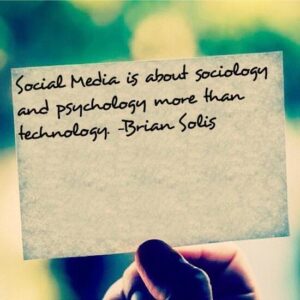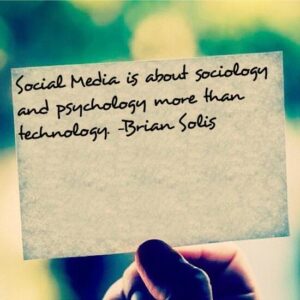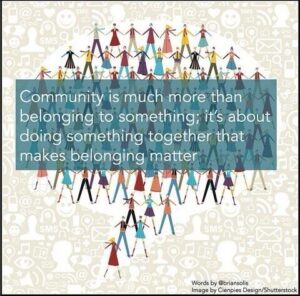
Most people view the social web as a tool for bringing people together and sharing ideas. They credit it with everything from democratizing media to enabling the protests of Arab spring, but they fail to see how these same community building attributes can fuel dangerous thought bubbles and lead us down paths of extremism.
By providing a forum for everyone, the web – especially social web platforms – allow us to connect with people we probably wouldnʼt be able to find offline. In most cases this is a positive trait. Advocates argue that this promotes greater collaboration and facilitates the sharing of ideas. But it has a darker side in that it can lead us down deep rabbit holes of thought by making small groups appear larger and more influential than they really are. Imagine someone who is a fanatical white supremacist and favors the reimplementation of slavery. As a percentage, like minded people would be a tiny number – perhaps .1%. In the real world, this would make it virtually impossible for this person to find others who share his views. But the internet provides a platform for everyone, and .1% of 300 million Americans is 300,000 people. Proportionally itʼs minuscule but for the racist looking for support, 300,000 is more than enough people to reinforce his ideas and lead him to believe that he has the support of the masses.
Iʼm not suggesting that the web is a bad thing, and I do believe its power to produce positive connections outweigh the negative aspects of where some of these connections may lead. But itʼs important to understand how our minds and the personalized social web create a feedback loop that blinds us to new ideas.
Research shows that it is natural human behavior to seek approval and avoid cognitive dissonance. Dr. Carol Tavris author of Mistakes Were Made but Not By Me describes decisions as being made at the top of a pyramid. Two people can begin with very similar beliefs but once they decide one way or the other – for example two moderates, one choosing Republican, the other Democrat – they then self identify and start sliding down the sides of the pyramid drifting further and further apart. This behavioral trait is built into all of us and makes true impartiality impossible. Our decisions will always be affected by previous choices that form our underlying beliefs.
Along with our need to avoid cognitive dissonance is our drive for social acceptance. In short, belonging to a group feels good. It provides support and reinforcement, a strong identity, and a sense that we are part of something greater than ourselves. Like all approval seeking tendencies, group belonging has itʼs roots in human survival. For millions of years the only way to survive was to belong to a strong core group – a village. If you were unwilling or incapable of fitting in, you were likely cast out and eaten by predators. Some would suggest that the modern world renders these human traits irrelevant but the modernization of the last 300 years is a blink of an eye in evolutionary terms and evolving past our instincts is not so easily done.
Contrary to the open collaborative world envisioned by internet utopians, the social web has instead mirrored our behavioral characteristics by evolving dynamics that push us into virtual villages. This is most apparent in how Facebook sorts our friends and decides what to show in our news feeds, although Googleʼs personal search results also share blame. Instead of showing us everything and letting us decide, Facebook and Google show us what they think we want to see essentially placing us into villages of reinforced beliefs.
As dangerous as this may be on the general web (see The Filter Bubble by Eli Pariser), nowhere is this thought bubble more prevalent than with the people building the platform on which it exist: Internet entrepreneurs. Unlike other industries that rely on old models of press to spread their message, much of the internet community is focused on building social media tools that are largely based on self promotion. Share your location, what youʼre eating, what youʼre buying, who youʼre with and definitely share what youʼre reading. Itʼs the equivalent of TV producers making reality shows about the lives of their friends. Essentially the social web has become itʼs own biggest advocate and unsurprisingly the entrepreneurs and their associates are its first adopters and the most adept at using it. The end result is a largely insular world of technology entrepreneurs using social media to reinforce each others beliefs in a virtual echo chamber that produces clone after clone of like “blank” for “blank” type companies instead of breaking new ground. From the outside looking in, it looks like a great club to be a part of where everyone seems to be the most popular kid in school. But this has resulted in a disproportionate amount of attention given to this segment of technology compared to say clean tech or industrial advances which arenʼt in the business of building their own media tools.
Some of the loudest noise emanating from the social web echo chamber has come from the death of Steve Jobs. The sharing of Jobsʼ quotes and wisdom have been deafening and yet I fear those who seek to pay tribute to his genius have fallen into the exact trap that Jobs railed against. It was well known that Jobs was an advocate of pursuing different interests and areas of study. Travel through India, design a staircase, study calligraphy, even his criticism that Bill Gates would have been a more interesting person if he had dropped acid or lived in an ashram speaks to Jobsʼ belief that ideas come from a combination of many sources. Jobs understood the importance of seeking knowledge outside his immediate realm and his resulting innovations made a major impact on several different industries.
Internet entrepreneurs have been given a blank slate to build a world that could only be imagined 20 years ago – a virtual world that will have great influence on the direction of the actual world. They can choose to be the architects of skyscrapers or the builders of tract homes. Most of us grew up in tract homes and they serve their purpose well, but as Jobsʼ put it, they donʼt leave a “dent in the universe.” I implore the internet innovators of today and tomorrow to get out of the echo chamber. Donʼt read the same books your friends read, seek out people who inhabit different spheres, stop believing what Techcrunch writes about you, explore the real world like Hemingway, Twain and Jobs and build a virtual skyscraper. The alternative is to slide deeper and deeper into a bigger bubble of small ideas.
Francisco Dao is the founder of 50Kings, a private community for technology and media innovators. He is a former leadership columnist for Inc.com, a lifelong entrepreneur, author and former stand-up comic. Follow him on Twitter.
Image credit: Shutterstock





As my network on Twitter grew this past week, I noted that many were RT or Tweeting the same things. It made me think and question importance, theirs and my own in this type of setting. Thanks for putting it all in words. Now to go write copy for the revamp of my website where I hope I am making a real difference in the real world.
My biggest fear is that our children are being conditioned into a digital world – online / TV / Games – which is their reality and which they consider as real. It is not the real world – and it is our role as parents to ensure that we provide the balance of the virtual and the real. Otherwise the ‘echo chamber’ just becomes bigger and bigger and so too the Universe of clones. Absolutely pursue different interests, travel, do sports , get involved in the community. It is a very rich world – we should appreciate it now – and not have regrets on our deathbeds. Great post. Thank you.
That was good.
These are good thoughts. Another issue with interaction in online social networks is that their enforced brevity and one-dimensionality obscures parts of peoples’ personalities, opinions, and value systems that are crucial to understanding and properly responding to ideas expressed by others. All I know about an online friends could be as little as what bands and movies they like. Social media encourages these types of shallow connections. For people who who understand the context of social media and know the difference between it and real human interaction, it’s not really dangerous, but for those who don’t… there’s a very real danger that a while generation will have an incorrect idea of what human society is like. Rude, vulgar, outspoken, venomous, etc. The kind of people you meet in the comments of a news article.
Great insights…. are people using social media networks primarily engaging with others of similar opinions? Also, despite the vast numbers of people registered on social media sites, many are sporadic users and many others do not engage on social media at all, or do not turn to it for news or opinions. Very important considerations when dealing with issues of broad societal importance, such in the public policy arena.
i think what it failed to mention is that not all ideas have equal merit. it briefly talks about white power groups and most people are well aware of their ideas but disagree with those ideas for a reason, not because they don’t know enough about them. now i could easily make some kind of bizarre philosophical argument on how all ideas are equal and possibly even elevate the racism and bigotry of white power groups to appear acceptable and possibly even beneficial. would doing that make it something other than what it is in the end though? would saying something like, “killing your children is an act of love,” make that idea true? i know someone out there could find their own “truth” in it i am sure. i am very familiar with right wing ideas and philosophy and have heard plenty of arguments in favor of their views, but those views are not mine because they are not equal to the views i embrace.
I think what this article failed to mention is that not all ideas have equal merit. It briefly talks about white power groups and most people are well aware of their ideas but disagree with those ideas for a reason, not because they don’t know enough about them. Now I could easily make some kind of bizarre philosophical argument on how all ideas are equal and possibly even elevate the racism and bigotry of white power groups to appear acceptable and possibly even beneficial. Would doing that make it something other than what it is in the end though? Would saying something like, “killing your children is an act of love,” make that idea true? I know someone out there could find their own “truth” in it I am sure. I am very familiar with right wing ideas and philosophy and have heard plenty of arguments in favor of their views, but those views are not mine because they are not equal to the views I embrace. Those views are aimed more at logic like 1+1=2, Not 1+1=5. But I am sure someone could find their own logic in such nonsense, like people who think evolution is a hoax.
Please
give me more information. I love it, Thanks again.
I hope this article goes viral.
Thank you Brian. You’ve inspired me to avoid that “bigger bubble of small ideas” and to ask myself “what sort of dent in this universe will I leave?”
To quote my son “Word”
It’s
been a pleasure reading your post. I have bookmarked your website so that I can
come back & read more in the future as well.
Mr.Brian, would you check your email, please ? I sent you an email asking you to permit me to translate this post to my native language.
I agree with your post. Although social media can be used to bring people together, spread ideas, beliefs and global news, the power of free speech it gives to people can be easily taken out of control quickly and dangerously. One outrageous tweet or Facebook from someone well known throughout the world can spiral out of control after it has been retweeted and reposted thousands of times. All it takes is one click of a button to spread a chauvinistic message or terrible rumor to influence millions of people and even ruin lives. There are individuals who are famous soley for what they share on their social media networks. Without the networks, people probably wouldn’t care about anything they had to say. People will believe something just based on who said it, rather than what is really being said in the message. I think social media can do a lot of good for the world and change it in ways we never thought was possible, but it can also do a lot of harm.